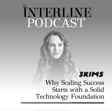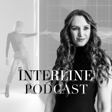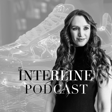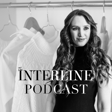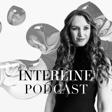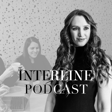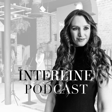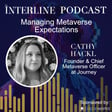Become a Creator today!Start creating today - Share your story with the world!
Start for free
00:00:00
00:00:01

Powering Resale for Conscious Retailers with Continue
Emma hosts Lydia Hartley, the Co-Founder of Continue - a startup enabling fashion brands to adopt circular practices and boost customer retention by powering their own peer-to-peer marketplaces.
Transcript
Introduction to Circular Economy and Continue
00:00:25
Speaker
basically just don't have time. If we can help them to engage then we're actually bringing a significant portion of the population back into the circular economy and engaging as well. So I think brands have a big role to play in this.
00:00:42
Speaker
Hello, everyone. Emma here, your host of the Interline podcast. This time on the show, we're talking to Lydia Hartley, the co-founder of Continue.
Continue's Mission in Resale Marketplaces
00:00:51
Speaker
Continue is a B2B software as a service startup on a mission to help retailers become more circular. Their technology is intended to help brands create their own peer-to-peer resale marketplaces with the goal of driving revenue growth, acquiring new customers and reducing their carbon footprint. The company has prioritized simplifying the journey towards circularity.
00:01:12
Speaker
recognizing that many brands and retailers are still daunted by the concept. And the added complexity of integrating technology can make it even more so. With her skill set of marketing, fashion, and technology, as well as being a young woman in the yeah UK where over-consumption is particularly problematic, Lydia provides a refreshing perspective on what it will take to scale sustainability. Lydia and I get into why resale is an opportunity not to be missed by brands and retailers.
The Importance of Resale for Brands
00:01:40
Speaker
how they can use it as a way of growing their businesses, the way that Continue is working to meaningfully and positively influence consumer culture, and the pragmatic steps the fashion industry can take to get to a technology-enabled, more sustainable future. Over now to my conversation with Lydia.
00:01:57
Speaker
Hello to all of our listeners to the Interline podcast. Today, I am thrilled to have Lydia Hartley, ah the co-founder of Continue here on the podcast. And it's really been a while um that we've been trying to get this in the calendar. And I'm so glad that we have Lydia on now. So ah welcome to the show, Lydia. Yeah. Thank you so much for having me, Emma. I'm really excited to be chatting with you today. And yeah.
00:02:23
Speaker
long time coming so that we could finally get it in the
Lydia Hartley's Career Journey
00:02:26
Speaker
calendar. Absolutely. um So let's get going by talking a little bit about your career and your journey to co-found and continue and a little bit about how you came to be in this position that you are now.
00:02:39
Speaker
Yeah absolutely, so I had a bit of a squiggly career up until this point so after university I am just taking it a long way back but I started working in advertising agencies when I first got out of university working with varieties of different fashion brands. I've always been really interested in fashion and ah how fashion brands can essentially market to their customers and really kind of change behaviours and worked with a range of different luxury brands there. Then I moved into the tech business actually and worked for a company called Dart Trace, which again, it was very, very different from what I was doing in media agencies. It was like cybersecurity, but set up partnerships with
00:03:23
Speaker
F1 teams like McLaren, the British F1 teams so have always been really interested also in like partnerships and that way that businesses can work together in order to drive ah awareness for each other and and grow for each other's businesses and yeah kind of have always been in that that sort of like marketing space but ah Yeah, working in tech, I've always been really interested in because you can obviously drive huge amounts of change and it's a great what the fastest growing sector at that time and all all
Challenges and Pivot to Continue
00:03:54
Speaker
very exciting. But as I said, always had a real big interest in fashion and particularly sustainable fashion. like When I was at university, I loved using Depop. I was always kind of, yeah, it was one of those Depop and eBay were really
00:04:09
Speaker
ah Yeah, catching fire and really of holding the hearts of younger people and just really got into that. and i never really like ah didn't I didn't fancy myself going into the traditional fashion industry because I felt like it was a little bit toxic. like I didn't really agree with a lot of the practices that are still i around today, a lot of them. and and the kind of the body image stuff and like all of these kind of like different values like it didn't really align but I really liked the nexus point between tech sustainability and fashion like that really interested me and whilst I was working in tech I actually started running these clothes swapping events
00:04:49
Speaker
as a hobby and that was basically when people would come in and bring clothes that they wanted to swap and yeah basically using your clothes as a currency to get new ones just because a lot of young people don't have much money but they have a lot of clothes so trying to kill two birds with one stone and then lockdown happened couldn't do the events and decided to so launch and that kind of set up my own platform for clothes swapping and did that very scrappily and used all the money I saved from lockdown to do that and it basically just grew and I actually went full time with that business after lockdown quit my job and yeah a lot of that was driven by TikTok and all these basically it's like uni students and and like teenagers just buying lee yeah just basically engaging and
00:05:33
Speaker
I um ah got accepted onto a startup accelerator called Textars, got VC back in for that business and grew up to about 10,000 users but found
Continue's Impact on SME Brands
00:05:44
Speaker
it tricky. The the kind of the business model around close-topping, it's hard to monetize because when you're swapping clothes for clothes, you know what point do people pay for that experience?
00:05:54
Speaker
so kind of like was rethinking what to do with that and what to do next because I was also i was a solo founder always looking for technical co-founders and because I wanted to be part of ah a team and i'm really building it with business partners by my side. is' It's a hard journey.
00:06:11
Speaker
at the best of times. And I basically met my two co-founders, Harry and Richie, who were building Continue Already and obviously Continue very similar space whereby, yeah, essentially more helping fashion brands to enter the whole pre-love space. and and driving change in circularity from from that perspective and that approach. So I got on really well with them and they were technical and I basically just decided to pivot slightly away from the kind of swapping B2C approach to the problem and more towards
00:06:46
Speaker
actually working directly with the brands who have all the data and all of the information about what we're purchasing to essentially utilize that to enable people to engage in pre-love in a much more accessible way and a lot more you know it's a lot more streamlined so um yeah essentially we're we're now working particularly with SME brands to launch their own pre-loved marketplaces and it's almost like a mini vintage but attached to their websites and it's completely white labeled so it looks like the rest of their website and ah basically we were solving a problem which is a lot of the biggest brands in the world have their own pre-loved marketplaces. I mean Shein even has their own pre-loved marketplace. Zara has ah like all the massive fashion our fashion brands and and and luxury brands as well really getting into this but
00:07:35
Speaker
There's a real gap in the market where SME businesses, which who make up, I think it's about 70% of the market, didn't have a solution whereby they could also launch their own pre-love initiatives in a very easy, cost-effective, logistically lightweight. So that's what we're basically building and we're we're aiming to do.
00:07:54
Speaker
And we we went for a bit of a period recently, but we re-launched the business in April and have onboarded 14 brands since then. So yeah, things are moving quickly and fast and and there's a lot of excitement and energy around the space and really excited to be part of it,
Lydia's Influence on Continue's Success
00:08:12
Speaker
basically. Yeah, it's great that you're coming from this place of, like you said, marketing, fashion,
00:08:18
Speaker
sustainability and technology because I think you have the vision um and then you could find some technical people who maybe also had a bit of a vision, but um I think your skill set and what you had an interest in is really probably what drove continue to be what it is today. So congratulations, 14 Brands is a lot actually. so um That's great. Yeah, no, definitely, definitely. And I think, yeah, a lot of ah lot of um but a lot of solo founders are either one or the other in terms of like their skillset. And I think it I had one of my um mentors for my last business say, oh, it's just so good to see you not running around so much like a headless chicken trying to do everything and just focusing really on what you're good at and letting the others do the rest of it. So I thought that was always good advice.
00:09:07
Speaker
Yeah,
Resale Industry Trends and Opportunities
00:09:08
Speaker
absolutely. um And so a part of that is you doing this thinking kind of for brands, and I was going to throw a stat out there that the resale industry is going to reach 140 billion pounds by 2027. And there's a real compelling chance for brands to integrate pre-loved items into their business model. And it really is going to be a missed opportunity if they don't.
00:09:31
Speaker
So a big part of getting into that is understanding the approach and how to talk about it, how to frame it. So how do you think in your experience and also what we've just spoken about, how should brands be thinking about tackling or going for this opportunity, tackling this problem however way you want to look at it?
00:09:49
Speaker
Yeah absolutely and it's it's it's tremendous how much growth there's been in in the resale industry and it's growing I think now three times the the rate of the traditional fashion industry so it's just such a massive opportunity for brands and I think historically brands and still now to be honest like there's still a lot of work to be done in some cases but they have really shied away from even thinking about pre-loved because I mean a lot of people will know that it's a hard time for retail.
Post-Purchase Engagement and Resale
00:10:21
Speaker
like you know A lot of businesses are struggling. Everyone's putting everything on sale. No one's buying full price. And a lot of these brands have kind of been like, no, let's just focus on our core business. We need to put all of our time and energy into that. Meanwhile, resale is skyrocketing. People are resetting their clothes all the time. And you know even these brands, I mean, our sweet spot is serving bands but brands who have between
00:10:46
Speaker
a million to 300 million in annual revenue. And even the brands that have a million in annual revenue, they have thousands of items on Vinted and other platforms as well. And it's just, why would you ignore this when your customers are literally doing this activity and you're not part of that conversation? And there's just so much that's happening post purchase now that brands need to be thinking about because times are changing and it doesn't just stop when someone buys something anymore.
00:11:14
Speaker
or they don't just send it to charity and they they you know throw it away or anything like that. like a lot of And particularly younger consumers are really being savvy about the way that they are consuming clothes post-purchase in terms of getting rid of it, but also acquiring new clothes. And we say to brands a lot of the time, it's like, you know your customers are doing this anyway. And it's an activity that is a powerful one. It's very meaningful in terms of they are engaging with other people around them to to essentially Yeah, to obviously get rid of their clothes, but also passing them on in in a meaningful way.
Community Building through Resale
00:11:49
Speaker
And we talked to to brands a lot about positioning and and how they want to talk about this. And a lot of the time, actually, the conversation is now about retention and about loyalty. And the reason being is that brands can now utilize resale.
00:12:05
Speaker
And obviously, they and our model is a peer-to-peer resell model. So we have we basically like launched our own like a mini vintage so their customers can resell their items via the brand's marketplace in a very easy way once say once they're done with them. So they would sell it to another customer so that the brand doesn't have to handle any of those logistics. like It just goes between the customers again. So it's reinforcing this community element.
00:12:28
Speaker
but we As part of our service, we can basically offer customers the opportunity to take store credit when they sell their items, and ah which obviously they can go and spend within the brand and in their ecosystem. So it's really about keeping them within that ecosystem, keeping them as loyal customers.
00:12:46
Speaker
and And thinking about you know how can we also talk to your VIPs? Because a lot of these brands, like it's crazy how many items their VIP customers feel like the most loyal customers have bought from them. like We work with a ah handbag brand brand called Sarah Harran, and some of her VIPs have bought 20 bags from her, and they're like a premium luxury brand. So it's like, how can we get these loyal customers really engaged, trading amongst themselves, <unk> really building up that community and that loyalty piece?
00:13:15
Speaker
and and really building on that retention which is so important in today's age where especially like with Google ads, social media ads, like acquisition is so challenging in terms of being so expensive nowadays and brands really need to build a much more sustainable business model whereby they are driving up the LTV really holding on to their customers for as long as possible and keeping their VIPs happy. And it's also another way of just creating a new customer experience, which is going to surprise and delight their customers as well. You know, saying, hey, like by the way, you can resell your items very easily via the brand when you when when you want to, essentially.
00:13:54
Speaker
and offering that. I mean, it also goes alongside like repairs, for example, like a lot of brands are doing repair services now. So they're helping their customers repair their items once, if there's anything that goes wrong. um So it's again, it's another way of building up. Yeah, that kind of positive sentiment around the brand
Resale as Marketing and Retention Strategy
00:14:14
Speaker
as well. And, um and also, yeah, obviously appealing to the younger conscious Genzias and millennials out there who Yeah, want to buy from brands who are doing better and are making efforts to do good. And it's very much a marketing play from that point of view as well. But from our standpoint, we're really, it's obviously a marketing play, but for us, it's also like a lot more down to like performance as well and and driving that retention for the brands. It's such an important piece of them right now.
00:14:43
Speaker
Yeah, for sure. And it's great that you can explain that because I imagine that brands have been fearful about the secondhand marketplace and how it would affect their first-hand revenue. And you've discussed a lot about the benefits of actually doing this, but um do you have you had to speak to brands about um what you've just told me and kind of at telling the story of resale um as a way of growing their business without having one vertical cannibalize another. So, talking specifically about first-hand revenue, um have you had to tell them, you know, these are all the benefits? It might eat into some of your first-hand revenue, but um yeah, what's what's been your experience?
00:15:24
Speaker
Yeah, yeah, exactly. So, I mean, the number one objection that we find from brands and we we receive during calls and first-time conversations is, oh, hold on, but what about if, you know, resells and pre-laff sorts, eating away at my new sales? Like, you know, is are people going to stop buying
Consumer Behavior Insights from Resale
00:15:43
Speaker
new? Are goingnna are they going to stop buying, you know, at full price? Like, what's going to happen to my sales? Like, they restart catastrophizing, I find it. It's always quite interesting because Pre-loved for brands is still like a very small part of their business to be completely honest, especially in the early days. So it's it's funny how brands really see this as like such a threat in terms of like involving into their business because it will take a quite a long time for the brand, for customers to really start buying pre-loved as much as they're buying new if they're going to the brand's website.
00:16:15
Speaker
it's It's kind of crazy how the brands think it's going to have such a crazy impact because it's still a small proportion of their business and it's more, as I mentioned, a way of just introducing a new type of service and playing around with that. But when we say when we when we talk to the brands like and they they say this sort of thing, we're just like, okay, but... they're doing it anyway like people are savvy nowadays like they are going to these pre-loved marketplaces so they'll actually know they'll go to your website they'll find something that they like and then they'll type it into vintage to try and find it pre-loved like that is like literally
00:16:51
Speaker
how a lot of people are engaging right now in fashion because they know they can get a big discount on other platforms. They know that a lot of people are saying things new without tags, new with tags, you know, basically new because people are buying things in a sensible way or not on ah or a mindful way either sometimes.
00:17:08
Speaker
So why would you not want to own this whole experience so that you know who is buying your items pre-loved so that you can you know retain them as a customer and eventually maybe sell something new to them and later down the line. So it's really about understanding who is buying your your items and you know a lot of the time as well it's not just you know the current customers who are wanting a ah discount it's also aspirational customers to that brand and that's where we're really seeing this with the luxury premium brands as well is that you know young consumers they might not be able to buy at full price so they might buy it pre-loved but you still want to know who they are because you know in five or ten years they might be able to buy at full price from you. So it's really about building up their audience and understanding their segments as well and and and having that visibility because otherwise they're losing loads of data along the way
00:18:01
Speaker
And it's just, it feels like it's such a blind spot for the brands and it's why ignore it, why why put your head in the sand basically when when you could really have all of this knowledge about everyone that's engaging with the brand and buying it even if they haven't bought from you full price before.
00:18:19
Speaker
So that's where we're really seeing it and also and then a lot of brands have dead stock items, sample stock, they're having like obviously massive clearance sales like we're saying to them why would you not just have one part of your website where all of this discounted kind of produce or merchandise is and you can sell sample stock via the marketplace, you could obviously have pre-love going on as well and we've actually seen really good engagement with selling sample stock via the marketplace because part of our marketplace is that customers can make offers and products so it's again similar to other other platforms out there and we've actually found about i think it's a 80 self-array on sample stock because customers like being able to make offers to the brands as well so it's been quite an interesting insight and it actually wasn't
00:19:05
Speaker
an intended feature necessarily but it seems to be working really nicely and and the brands are seeing seeing good results from that so because a lot of brands are just sitting on stock at the moment and eventually they're having to pay more money for that in the long term because they can't shift out their warehouses so again it's it's solving that that issue for them as well.
00:19:26
Speaker
Yeah, definitely.
Cultural Shifts towards Sustainability
00:19:28
Speaker
um And I wonder, I'm curious, your position, um obviously, as a founder, and you care about sustainability, of course, you're also providing the business to to brands. How do you feel about overconsumption? Because the UK where you're from is one of the worst offenders when it comes to overconsumption of clothing.
00:19:50
Speaker
And I often write about and I think about consumer behavior. I know I've changed my behavior so much since I've been in the fashion industry for you the past few years. And PwC is saying things like the primary mechanism for the fashion industry to tackle this problem um is the introduction and scaling of circular business models such as the resale um of existing products. So how do you think the wider availability of circular and resale business models so um is going to affect consumer behavior? we We've touched on it already, but
00:20:27
Speaker
Is it part of the bigger picture? Does something else need to change? I speak to friends and some of them are just really unaware of all of this. um I don't know so What do you think? Yeah, 100%. So it's a tricky one, because you see people engaging in these secondhand platforms. And I think a big part of the reason why they're engaging is obviously they want to be more conscious, but the biggest thing is probably the discounts and the price point, especially in the current economic situation that we're in. So when we're looking at how people are engaging, but but more importantly, why they're engaging, it is probably
00:21:06
Speaker
price element which is driving them the most, which is obviously meaning that behaviours in terms of ah the the meaning behind them maybe hasn't changed as much as we like to think and I'm just saying that bluntly because I think it's a reality that we do need to think about and how we're going to change those behaviours and thought processes around why we're how we're engaging in pre-loved and why and and why we're buying so many items and A lot of it just comes down to the meaning that we we put on on buying new things and and how that makes us feel and giving us a dopamine hit you know when we click buy on TikTok or Instagram at a moment of weakness. And I think a lot of it's going to come down to cultural change and how we can really
00:21:54
Speaker
from, and it's not, it's not going it's go to be a one silver bullet, it's going to come from multiple different angles in terms of the way that we approach kind of over consumption and actually hopefully making it so that goes out of fashion and we can say okay but under consumption is cool now. like how many items you have in your wardrobe okay my wardrobe is full of clothes and it's not like completely jam-packed I've got so much stuff I'm buying stuff all the time ya ya yada yada yada it's more I've only got a tiny you know capsule wardrobe that I'm really pleased with and it's just really quality pieces in that I'm buying less and there's so many different like movements out there now which is like you know the rule of five only buying five new items a year you know I have a lot of people saying to me that they're not buying any new items anymore they're trying to make the most of their wardrobe or
00:22:38
Speaker
ah they're only buying pre-loved but I realise that I'm also in a massive bubble where I'm around people who are engaged in circularity and care about this whole this whole conundrum that we're in and a big conundrum at that so I think it's really going to come down to the culture elements you know how can we get influences like people of importance to really push this narrative and and really kind of also create this grassroots movement to yeah basically get younger people to really say, no, like this is this is not right and we're not this
Engaging Different Generations in Resale
00:23:11
Speaker
isn't cool anymore. like We don't want to consumers match. So I think it's it's it's a tricky one because with resale, I think it's it's going to contribute. And I think it's really helping that also the brands are encouraging people to engage. And that actually, this is another big point that the reason why we started the business is so
00:23:31
Speaker
We wanted to work with the brands because if they're making it even easier for their consult that their customers to engage in pre-loved, and it might even be customers that haven't even used Vintill or eBay or Depot before, like people who couldn't be bothered to upload their items because they couldn't be bothered to take photos, upload information about their pieces, it's just not part of their daily life and they they just don't have time.
00:23:52
Speaker
um If we can help them to engage, then we're actually bringing a significant proportion of the of the population back into the circular economy and engaging as well. So I think brands have a big role to play in this. And also, I guess like the utopian vision is that if we can bring circular propositions and and new ways of doing things into these brands, we can essentially help them to make money from circularities so that they don't have to produce it so as much in the first place. And I think it's really, if we boil it down, it's the overproduction of products which is causing all of this. and um And I think that will really help things as well if we can really help them drive these kind of more circular business models rather than the linear and really relying on overproduction to essentially power their business and make them profitable.
00:24:49
Speaker
No, that makes a lot of sense for sure. um I completely agree. I think it's like that that major cultural shift. And I do think as we've spoken about now, it is coming a lot from, you know, Generation Alpha and Gen Z.
00:25:04
Speaker
um, millennials as well. I think we've been comfortable with this move to online shopping. And this means more reliance on product reviews, social media, and influencer recommendations, which we just spoke about. Like there's such a big part for so many people to play in this shift. Um, so how do you think resale fits into, I guess, well, we've spoken about Gen Z.
00:25:30
Speaker
Um, do you have an opinion about how it's affected like millennials as well as, I guess, um, the other generations, but it's generation X, the boomers. Um, yeah. What is today's consumer? I guess in the different segments, what do they want? Um, and yeah, is, is it realistic to say that, uh, can Gen Z and Gen Alpha carry everybody basically? And I guess millennials to an extent, but yeah, who,
00:25:58
Speaker
who is going to be the one that drives the change? Really I mean you don't want to generalize a whole I guess movement of people or or generation because everyone's got their own different ways of engaging in pre-love and I don't think it's just as easy as saying this generation does this and this generation does that but I would say that there are some kind of underlying themes and trends whereby millennials, I think, and and potentially boomers are very interested in convenience. And whether that be through high street shopping for the likes of the boomers or mainly millennials, it's so online shopping, which they're engaging with, you know, they they want to find something as quickly as possible. They want to have recommendations. They want to see, ah you know, product reviews to understand you know the trust and reliability or what they're buying as well.
00:26:49
Speaker
I think Gen Z they're a lot more interested in community and how they can use shopping as a way of building relationships with their friends and that's why like all of these pop-ups you see on like the high street and like vintage shopping and charity shopping like it's such a big thing for them because they're using it as a way of a creating content for themselves especially on TikTok but also as a way of connecting with their friends and doing something that binds them together in a way that is and also just like highlighting to everyone else that this is our identity that they care about buying pre-love because they care about being more conscious but they also like finding new treasures they like being unique they like showing their and own personal style and I think like the individuality is such a big part for Gen Z
00:27:34
Speaker
Whereas I think millennials, they're probably tying a lot more to potentially influences and and looking for very specific things and and trying to find the quickest route to getting there. But again, like it it's so hard to tie it down just to generations. But I think those are a lot of the the trends I'm seeing. And even from like the whole close looking thing I did, like that was such a community thing. And we saw a lot of you know I got 15 year olds, 14 year olds coming to these swaps, you know, without their parents and I think like those sort of younger consumers and it's been really exciting to see how they kind of are shopping and and how that will potentially change things.
00:28:15
Speaker
um moving forward even for the new generations coming below them so I think there's definitely positive tova yet trends coming about and I think also of resale it's been really interesting again kind of what I touched upon that A lot of the time, obviously, younger people are engaging in in secondhand and and resale platforms. But again, this is where we really see the opportunity. If we go through the brands, can we get slightly older generations to engage in pre-lub by making it super easy for them, literally?
00:28:47
Speaker
sending them email. Do you want to resell your item that you've had for 12 months? ah Here's a link to the item in your digital wardrobe on the platform. Here's the listing. All you have to do is put in the price and and the the shipping does shipping information. There it goes. like It's done. you know And my mum doesn't engage in Vinted because she doesn't know how it works. So how can we make it more accessible to it to everyone, basically? And I think that's really exciting. Yeah, absolutely. You mentioned mums in their shopping ways. I agree. I think a lot of people actually want to buy in. They want to do this, but maybe they just aren't intimidated or they don't know even that it's possible. So um I think that's a really good point. And it is super exciting to see these really young, young people, you know, 15, 14 year olds to see them caring about this, even if it's for the community. I think there is still an element of them caring about the earth. and
00:29:46
Speaker
because you know
Continue's Marketplace Technology
00:29:47
Speaker
there's so much going on. But ah before I get to that, i I wanted to ask you about continuous technology um and how it differs from similar marketplaces. What impact will it have on the brands that you partner with? To fall like an overview of this, like I mentioned, so very much want to appeal to the smaller medium-sized businesses out there. So our marketplace is essentially very light touch for the brands. It's a one-click integration with all the major e-commerce platforms out there. And again, appealing to them because a lot of these kind of SME brands, they haven't got massive development teams. They haven't got loads of budget to put towards all resources and team members to put towards building out these resale marketplaces and shifting away their their attention from you know business as usual. So one-click integration, we have it's like a platform in itself. so
00:30:42
Speaker
connect to their Shopify platforms there's no like crazy integration and we can basically get the marketplace set up in a week if we want to, excluding like all the promotions we want to do around launching. But it really is moving towards becoming a lot more turnkey and our mission and and I guess vision as well is to make this so turnkey that if a brand wants to set up their own marketplace they can literally do it all themselves. There'll be a platform out there where they'll be able to sign in, they'll be able to customize it however they like, they'll have all of the email automations that they need in order for it to work and they can just like click it live and it goes live and it's just that easy and I think it should become that turnkey because we're getting a lot of like even
00:31:24
Speaker
start-up brands coming to us saying that they want to integrate Resell into their business from the very outset, which is just really fascinating to me that they're thinking about this and and seeing this as a way of bullet-proofing their business from the get-go and a way of also standing out from the crowd. But like I mentioned, it's peer-to-peer completely. So again, it's very different to other models out there because A lot of other, I guess, players in the space are trying to do everything for the brands, so they'll offer tape-out schemes, they'll offer yeah they might offer peer-to-peer, but a lot of it is offering more of a consultancy approach whereby we're saying, well, we know that customers are engaging peer-to-peer, we know that's the easiest way for the the brands to get involved. How can we build out this product so it works both for customers and for the brands themselves? And it's just is's just like the easiest way for them to engage and
00:32:14
Speaker
when we speak to brands, like literally the conversation goes, yeah, this is actually perfect for what we need because I haven't got a whole team that can manage all the logistics behind getting people to send back things to our warehouse and and refurbishing them and doing everything around that. And there's so many overheads that come with that and the costs just start soaring and that's just not what the brands want. So we're really, really focused on peer to peer and it's doing that basically the best we can and being just like experts in that space.
00:32:43
Speaker
A big differentiator as well is we have this whole marketplace engine built into the back of the marketplace, which is basically automating all of the communications between, well, basically to to to drive supply and demand in the marketplace. So I kind of alluded to it earlier, but we can essentially, because we know what's in people's wardrobes, right? like Because we have all the information from the brand. We have all their data about all their order history. So we can prompt people to sell their items more than obviously any of the other platforms like Vintil or Depop can do. so For example, I say to a customer, hey, I've seen that you've owned your item for 12 months. Here's a link to your digital wardrobe. You can sell it within a few clicks. Or, hey, we've seen that people are looking for the item that you owe you've owned for two years. Do you want to resell it? like There's so many ways that we can match make as well.
00:33:30
Speaker
And I think that's really exciting in a way that we can, we basically want to use the product to do all the work for the brand. Like we want it to drive the marketplace forward. We want to drive the engagement just through all of this automation so that they can just click it live and it's working. And the brand can really focus on all the marketing aspects around it that is more like around the brand messaging and kind of like how they want to incorporate it into storytelling. And there's so much also like user generated content that they can drive from pre-loved and and you know showing customers loving their pre-loved bag or their pre-loved jumper that they bought from the um the brand's marketplace and and creating that real good feel factor. so um So yeah, that's what we're really excited building out. And again, like my how I mentioned, it's all about like the whole retention piece and
00:34:18
Speaker
and how we can re-engage customers that haven't engaged in a while. For example, if a but if a customer bought something from you 12 months ago or longer than that, we can say to them, hey, so you had your item, you want you know do you want to resell it, his store credit, spend on something else, et cetera, et cetera. So it's really bringing back people into the fold. And I think that's this that is just like the number one aim for the brands at the moment. So really excited about that. And obviously like selling a sample stock, as I mentioned before, people making offers,
00:34:47
Speaker
And the whole offer technology is obviously like really impactful. and And yeah, we just want to facilitate all these conversations and really pull out interesting data. I mean, like for me, what I would really want to start diving into is the reason why people are selling their items and when they're selling their items as well. like What is the meaning? And and you know can we pull out information about their descriptions? like Oh, I'm reselling this because it was too big for me. Or the sizing was like not what I thought it would be. or it you know ah god a hole was in it within a year. like How can the brands utilize that data to actually improve their operations and to improve their design patterns and operations too? So I think um we're and early in our journey, but there's so much that we we can do with it. And I think like the first step is really just making sure that these marketplaces are working by themselves.
00:35:39
Speaker
and then really like kind of diving deeper in the data and and the ways that we can use it in order to help the brand's business grow. Data is golden these days. Like you said, it really can play such a big role in how the brands will, I guess, grow in the next 10 years because they can use that to re-implement into their designs. And I think it's so powerful. No, absolutely.
00:36:04
Speaker
um No, that's really, really interesting from the technology technology side.
Sustainable Fashion's Future and Legislative Support
00:36:09
Speaker
And I want to get your perspective zooming out a bit on the greater future for sustainable fashion um and how we get there.
00:36:18
Speaker
from a pragmatic perspective. You've spoken a bit about it, obviously, with the platform that Continue is building, with this the data that's, like we just said, it's so powerful. um So how much does Reset form a part of the bigger picture? And um along with that, can you share anything that Continue is going to be working on ah to further your vision of this future of sustainable fashion?
00:36:47
Speaker
Yeah, in terms of the future of Continue, so um yeah, like I mentioned, we're launching, well we've signed 14 brands and the really exciting part is obviously building out the product and and and really driving forward with that innovation. but We're working with a lot of a big variety of brands actually. So we're working with bridal brand, kids wear brand. We're just onboard our first ski wear brand, kids wear, like there's so many different areas of the fashion industry that a lot of people don't even think of. They think of the traditional kind of women's wear, men's wear, but that there's just so much opportunity for pre-loved in every every facet of it. And I'm really excited about diving into the different segments and really
00:37:28
Speaker
Yeah, driving change across the board. and And yeah, so really excited about that, particularly as you bridle bridles like a massive ah massive massive growth ah market for us. So um so yeah, just continue selling brands and and and driving home the the product. And yeah, got some cool partnerships coming up too and working across the kind of e-commerce landscape to really kind of yeah help brands to drive growth also in a sustainable way. So that's kind of ah where we're going currently. Obviously that the the circular business models of resale, repair, swapping even, like that is a portion, like actually just like a fraction of this whole but ecosystem and what actually needs to happen in order to drive change. I mean,
00:38:17
Speaker
From the resale perspective, businesses overall, they care about being profitable, they care about growing. And again, part of our mission is really how can we enable brands to continue to meet those targets and to meet their goals. and ambitions whilst also having resale as part of that picture and how can we make it so resale is adding to the business in a positive way financially rather than draining the business and it's just like a big no-no like most these brands especially working for the SME brands like they don't they they can't afford to add another course of business like this needs to make sense from day one from a cost perspective.
00:38:55
Speaker
So I think enabling brands to continue to do well is such an important thing but also like how can we help them do well whilst also becoming more circular. and and and reducing how much they're making and and actually just really changing up their whole business model to align with where we need to get to in terms of Team Net Zero and and and just fighting all of the waste that's being produced in this industry, which is just like appalling at the moment. Obviously, like businesses a lot of the time won't do this by themselves. They need pushes along the way. There's legislation coming in from the government.
00:39:33
Speaker
across the EU, also in the US, ah where ah producers need to take accountability for the products that they're creating, you know, France has banned fast fashion, there's more and more rules and and laws coming in, which is going to definitely help. But, you know, it does take a while for these to come into force. So it's really down to the businesses and their leaders to drive change now when we really need it.
Technological Innovations in Recycling
00:39:57
Speaker
So um and and And then I guess like consumers as well, I mean they can they can do their part and consumers have never had a bigger voice and on on social media and TikTok where they can literally call out brands and talk about what they're buying pre-loved and how they're upcycling their clothes and what they're doing to be more conscious. So I think like that does really help from a cultural perspective as well.
00:40:19
Speaker
um But I think like at the moment it's the cultural shift away from you know just buying, buying, buying and that kind of overconsumption and how can we help people to buy better and and buy less. And I think that is going to really drive change too. so um And also like recycling, I don't know how much you know, but like kind of recycling textiles but at the moment it's really tricky. I think only about 1% of textiles actually gets recycled at the moment because they basically kind of mesh all the fabrics together in terms of the material so it's basically very hard to um separate those and actually recycle polyester or recycle cotton because they're just making a blend which makes things a lot harder so there's a lot of new exciting businesses who are
00:41:09
Speaker
launching this space and really working hard to change that and I'm really excited about that technology as well and and and I think the governments need to do a lot more to support those types of businesses given that the over the heads that they do have um being so kind of labour intensive and yeah so there's a lot of different areas and it's going to take a lot of effort and work to get to where we need to be but it's going to have to come from all three elements so yeah businesses, government and consumers as well. And yeah, fingers crossed we can get there in time, basically.
00:41:46
Speaker
Yeah, exactly. um We speak to a lot of recycling business. Well, not a lot, because there aren't so many, but we've spoken to Sire and Ryu, who I'm sure you've heard of. and They are just really, that they're doing their best, like you said. It's it's from everybody. and And those in particular, like they are really trying to scale their efforts. and And every founder that I actually speak to, they're like, we have to do this so fast, like like you as well. You know, you know it's so urgent. um the tremendous problem. But but um thank goodness we have these businesses in the sustainability and technology space. And I do feel optimistic we're going to get there. I just also hope that it's sooner than later.
Conclusion and Call to Action
00:42:30
Speaker
um Lydia, it's been an absolute pleasure. Yeah, thank you so much, Emma. I really enjoyed it. Thanks for having me. I really hope you enjoyed this episode with Continue and my discussion with Lydia.
00:42:43
Speaker
Be sure to give the company a follow on their social media platforms and look out for some exciting partnerships and developments in their pipeline. There are many more exciting guests in our podcast pipeline. So make sure you subscribe to The Interline wherever you listen to podcasts and give us a follow on LinkedIn and Instagram. Also, be sure to visit The Interline's website and read our recently released 2024 Sustainability Report for more on how circularity is influencing not just environmental impact, but the future of fashion skills. The report is completely ungated and free to read and is essential reading for all fashion professionals wanting to understand the developing role that technology solutions are playing
00:43:24
Speaker
in changing the sustainability profile of fashion and how the fashion industry still has to travel quite a long way. And lastly, make sure you subscribe to our weekly newsletter, where we give you our analysis into the biggest stories of the week in the world of fashion technology. Thanks for listening. Bye.


